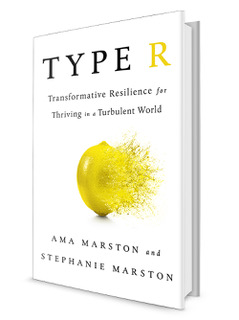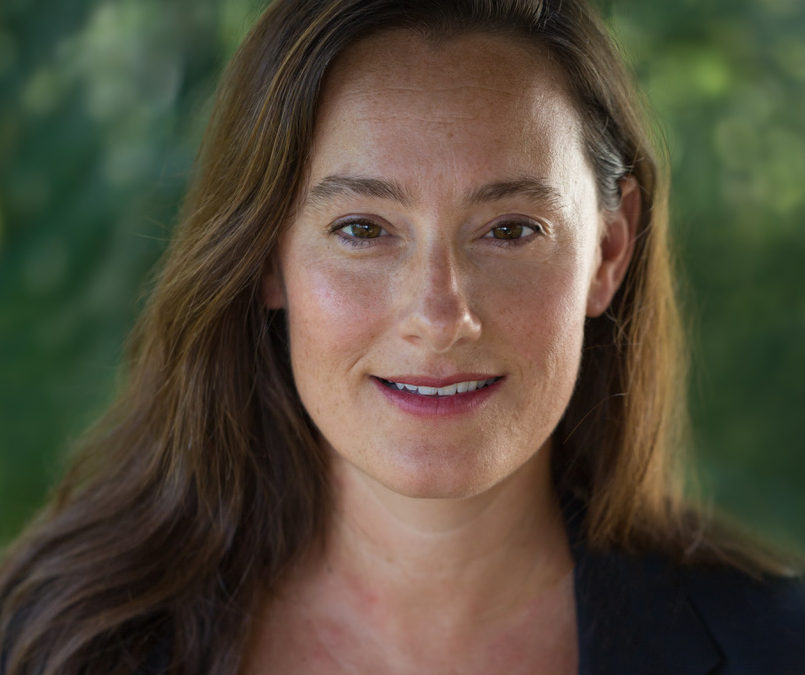Today we have the pleasure of interviewing author, entrepreneur and innovator, Ama Marston, about the concepts of transformative resilience and Type-R, which are a critical part of social innovation.
What are Type R and transformative resilience? Could you please tell us more about these two concepts?
A number of shake-ups in my professional and personal life led me to research what differentiates those of us who are knocked down by challenging circumstances and those of us who are able to use them as a springboard for the next iterations of ourselves. And when I say ourselves, it could be us as individuals, leaders, organizations, or even nations.
The two ideas that we’ve introduced in the book are Type Rs– the resilient individuals, leaders, organizations, or even communities, and nations that turn challenges into opportunities, innovation, and growth.
The second idea is transformative resilience. When we talk about transformative resilience, we’re trying to get past this notion of bouncing back, and it’s really about forward motion and about using our challenges, stresses, and our failures to catapult us forward.
So by introducing the concept of Type R you’re saying that if there is a hardship in your life, if there is a big challenge, you should just “take the bull by the horns” i.e. deal with it and allow it to make you grow?
We all need to take time to acknowledge disappointments, stresses and losses as well as recognizing that some of those will be of a larger scale than others. At the same time we need to start to reframe, find new strengths, find lessons that let us create next iterations or new solutions and new ways of thinking and operating in the world in the face of today’s growing challenges.
We all have the ability to learn and grow no matter where we are in our development. That can be as individuals or as a family, peers, colleagues etc. because we heavily influence one another and we bring our own basic skills and mindsets into groups, into innovations, into policies, and into the larger world. This is the essence of transformative resilience. And, an important part of transformative resilience is also confronting inequality, outdated systems and policies, and creating needed change in the world.
You co-wrote your book with your mother. How did you come by the idea to write it with her, what was your role, what was her role and how did you work together on this?
It’s not something that I expected would ever happen but both my mom and I were working as female entrepreneurs in parallel to one another and during some difficult years we were supporting one another. My mom has a psychology and corporate consulting background. I have an international affairs and leadership and organizational perspective. We felt that together we could contribute something new because the conversations previously were very focused on the notion of ‘bouncing back’. And they either focused on the individual or they were very focused on the macro level and how an economy bounces back after financial crisis, etc.
You come from a different career path than your mother and there is a generational gap so it shows that Type R people are in all generations, genders or walks of life; and thus, it’s not only for high-exposure business leaders e.g. CEOs.
You can be a Type R and you can show the ability to learn and grow from challenges if you’re in any kind of leadership position. Leadership takes place at multiple levels and I think we have misconceptions about what leadership is. We might show leadership by being the head of a family or taking an informal leadership role in certain circumstances, we can lead over projects or processes, in addition to whole teams, organizations, and nations…
But in general, this really is a time of great change: it’s a time of shocking politics, increasing pressures whether it’s climate change, whether it’s growing economic inequality, refugees. We have so much to deal with…
On a recent trip to Iceland I saw the place where the American and Eurasian tectonic plates come together and also pull apart from one another. I thought a lot about how uncomfortable changes, shake-ups, and fault-lines can be whether those are figurative or literal. In dealing with any issues we must ensure that transformative resilience is part of the outcome and that discomfort and frictions we go through can lead to productive things. Take Iceland’s case, where the fault-lines and volcanic activity create geothermal power that’s powering the whole country. So it’s a very literal example, whereas some of the other frictions that we’re facing are political, financial, economic, or cultural.
How can we relate the concepts of Type R and transformative resilience to social innovation?
Social innovators are people who often bring their own unique mindsets, skills, abilities and vision to what they do. Often when you’re thinking outside the box (which most social innovators are), you aren’t always welcomed. It takes a while for your ideas to gain support and traction. It can be very isolating. You may have to go through multiple iterations and therefore have to be persistent and draw on things like a deeper sense of purpose. Many of the Type R abilities (e.g. the mindset) are fundamental to social innovators. I think many social innovators already have some of the foundations and can continue to strengthen the Type R mindset and skills.
How does the process of transformative resilience overlap with the Social Innovation Process?
I know that Social Innovation Academy often refers to a six-stage innovation process, and there is definitely some overlap.
Transformative resilience often starts with the status quo or being in our comfort zones. We don’t often question it; it’s just the way that things are done, we’ve come to accept it. It may be quite dysfunctional but we’re not able to see it until there’s a major disruption that’s introduced. In the innovation cycle, you would talk about it as kind of a prompt.
Then you have this disruption, it often throws people, teams, businesses or communities into chaos. There’s a period of confusion. There might be a time when we’re in denial about things and we don’t know what the next step is. Then we get beyond the confusion to the point where we have a catalyst, an ‘aha’ moment, which is really a proposal stage in the innovation process.
A new idea crystallizes and lets you see things in a different way. From there we see the integration stage, which is just about experimenting, prototyping, adjusting, seeing what works, what doesn’t work, and what solution is sustainable.
After you’ve tested it out, and you’ve learned the lessons and found a new way or a new solution, then you can scale up. The social innovation cycle refers to systemic change and that’s very much what Type Rs do: they start with themselves, they create change and they develop new mindsets and skills. Then they take that into their leadership, their organizations, their families, businesses, or even communities, and nations. Once you’re scaling up to the systemic level you’ve created a new normal. And that becomes the status quo until it doesn’t work any longer and we have to adapt and reinvent once again.
For more information and to take a free Type R assessment go to: www.type-r-resilience.com.
Interviewed by Dariusz Sikora

Ama Marston is an entrepreneur and internationally recognized leadership and purpose led business expert. She has worked with some of the world’s poorest people as well as most powerful. This includes work on five continents with international leaders like Mary Robinson, economist Joseph Stiglitz, the United Nations, FTSE 100 and Fortune 500 companies, Oxford University and a number of NGOs.
She is the coauthor of Type-R: Transformative Resilience for Thriving in a Turbulent World, which has recently won a gold medal from Axiom, the most prominent business book awards. She has long been hailed an original thinker and innovator. She has been featured in media outlets like The New York Times, Harvard Business Review, and Forbes and in innovation forums such as South by Southwest and UC Berkeley’s Sutardja Center for Technology and Entrepreneurship.
Twitter:@AmaMarston 
Would you like to learn more from other inspiring social innovators?
Check out the Social Innovation Academy – the first fully online management training programme focusing exclusively on social innovation. If you are interested in keeping up with this project, you can subscribe to our newsletter, become one of our friends or follow us on social media (LinkedIn, Twitter and Facebook). We welcome all requests for collaboration here.

